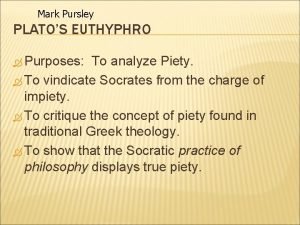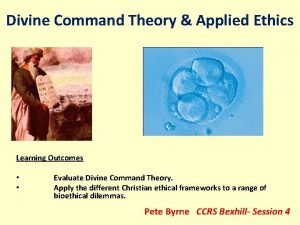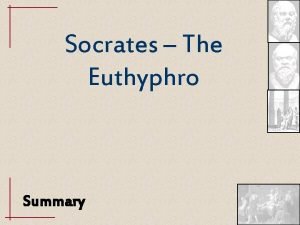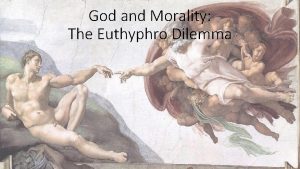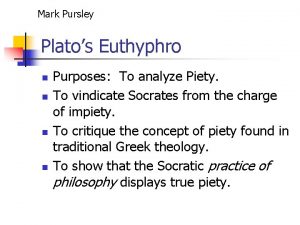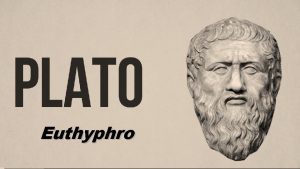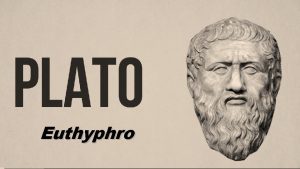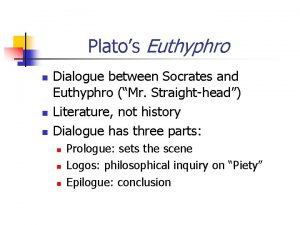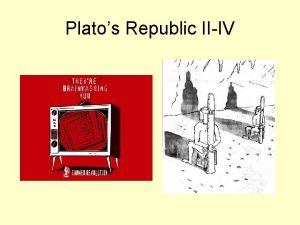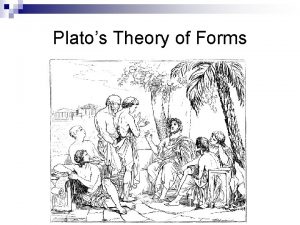Mark Pursley PLATOS EUTHYPHRO Purposes To analyze Piety














- Slides: 14

Mark Pursley PLATO’S EUTHYPHRO Purposes: To analyze Piety. To vindicate Socrates from the charge of impiety. To critique the concept of piety found in traditional Greek theology. To show that the Socratic practice of philosophy displays true piety.

WHAT IS PIETY? Def. I: Doing what I am doing; prosecuting anyone guilty of murder, sacrilege, etc. whether it’s your father, mother, or whoever. Appeal to divine precedent. Socrates responds: Do you really believe these things are true? Moral blindspots in ancient scriptures. If an ancient text condones evil or condemns behavior that is morally neutral, how can we treat it as a source of moral authority? Def. 1, not a true definition, gives a particular example not a universal formula.

BLIND SPOTS AND HALLUCINATIONS The “ban”- holy war in Israel. Slavery Status of women Homosexuality Anti-Semitism Child abuse The environment Exclusivism Ritual purity Menstruation Blends Dietary laws

DEFINITIONS 2 &3 Piety is that which is dear to the gods, and impiety is that which is not dear to them. Problem of divine discord, dear to Zeus, but not to Chronos. All the gods agree with me! Religious Epistemology Problem What proof have you that in the opinion of all the gods. . ? Def. 3: What all the gods hate is impious, and what they love is pious or holy.

PROBLEMS FOR DEF. 3 Is the pious loved by the gods because it is pious, or is it pious because it is loved by the gods? A: Killing is wrong because God says “Thou shalt not kill. ” or B: God says “Thou shalt not kill” because killing is wrong. Piety is not equivalent to loved by the gods. An attribute, but not the essence of piety (the essence will reveal why the gods love piety). Aporia, puzzlement. Euthyphro’s arrogance exposed as ignorance.

SOCRATES TAKES THE LEAD: JUSTICE AND PIETY COMPARED. Relation between Justice and piety: All just acts are pious or All pious acts are just? J P Def. 4: Piety or holiness is that part of justice which attends to the god’s, as there is the other part of justice that attends to men. Service benefits, how can we benefit the gods?

PIETY: HELPING THE GOD’S ACHIEVE THEIR AIMS. It’s the sort of service that servant’s show their masters. . A sort of ministration (huperetike) to the gods. A craft or skill that has an aim. What is that fair work which the gods do by the help of our ministrations? E: Many and fair are the works they do. S: Chief or principal thing they use us for?

DEFINITION 5 REDUCED TO DEF. 3 Def. 5: Piety or holiness is learning how to please the gods in word and deed, by prayers and sacrifices. Such Piety is the salvation of families and states. Why did you turn aside? Prayer= asking the gods for things; sacrifice= giving the gods things. (What can you give a god? ) Bartering skill? Tributes of honor and what pleases them. Pleasing but not beneficial?

PLATO’S CRITIQUE OF GREEK THEOLOGY One cannot serve the gods by offering sacrifices and requesting favors. Service is rendered only by actions that assist the gods in achieving their goals. No divine goals are furthered by animal slaughter. How does one serve the gods?

TWO CONCEPTIONS OF PIETY Ritualistic Religion (prayer and sacrifice piety). Make the gods happy with your gifts, secure their help in achieving your goals. Ethical religion (moral fruit piety). Serve divine aims by promoting virtuous conduct: (1) exposing intellectual arrogance by questioning unexamined assumptions and, (2) exhorting others to value character over fame or material gain. Go and learn what this means, “I desire mercy, not sacrifice. ” Mt. 9. 13

PLATO’S APOLOGY In 399 B. C. E. , in Athens, Socrates, aged 70, was brought to trial on the following charges: Socrates is guilty of refusing to recognize the gods recognized by the state, and of introducing other new divinities. He is also guilty of corrupting the youth. The penalty demanded is death.

REFUTATION OF THE OLD ACCUSERS Socrates is guilty of needless curiosity and meddling interference, inquiring into things beneath earth and in the sky, making the weaker argument stronger, and teaching others to do the same. (19 b) Origin of the old charges. Charephon’s query at the Delphic Oracle: Is any one wiser than Socrates? No. What does the god mean? I know I am not wise at all. Testing the oracle by examining politicians, poets, and craftsmen. …neither of us knows anything worthwhile; but he thinks he does and does not, and I do not and do not think I do. (21 d)

THE SOCRATIC MISSION Negative (therapeutic) task: To expose false claims to knowledge. The profession of ignorance. He is wisest who knows his wisdom is worth nothing. Positive task: Exhortations to virtue. God’s gadfly. Value wisdom, truth, and character over wealth, reputation, and honor. I go about doing nothing but persuading you…to care not for body or money …so much as excellence of soul. (30 a. b) I believe you have yet to gain a greater good than my Service to the God.

GOD’S GADFLY For if you kill me you will not easily find a successor to me, who, if I may use such a ludicrous figure of speech, am a sort of gadfly, given to the state by God; and the state is a great and noble stead who is tardy in his motions owing to his very size, and requires to be stirred into life. I am that gadfly which God has attached to the state, and all day long and in all places am always 31 a fastening upon you, arousing and persuading and reproaching you. You will not easily find another like me, and therefore I would advise you to spare me.
 Mark pursley
Mark pursley How did ideas about piety and a simple life change
How did ideas about piety and a simple life change Whats filial piety
Whats filial piety Filial piety def
Filial piety def Piety in a sentence
Piety in a sentence If they desire that piety and godliness
If they desire that piety and godliness Filial piety
Filial piety If they desire that piety and godliness
If they desire that piety and godliness Popular piety bbc bitesize
Popular piety bbc bitesize Why is filial piety important
Why is filial piety important Euthyphro dilemma
Euthyphro dilemma Euthyphro dilemma summary
Euthyphro dilemma summary God commands something because it is good
God commands something because it is good Euthyphro dilemma
Euthyphro dilemma Platos típicos de italia
Platos típicos de italia



